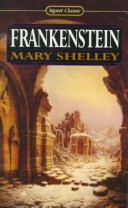Reviewed by celinenyx on
I read the abridged and simplified version when I was young, and well, I though it was pretty boring. Now I read the original unabridged version I can only begin understanding how brilliant this story really is.
Sceptic as I am, every time I heard people raving about how the genius 18 years-old Mary Shelley wrote this astonishing tale, I thought that this was just overrated following-the-crowd crap. But I got to admit; good old Mary captures human nature just perfectly.
We see the ambitious Victor Frankenstein grow up, see how he passes time with his caring family, we see his drive, how he developed his affection for his studies. Life is still fun and it holds great promise for the future; but we all know there are terrible things about to happen, and Shelley won't let us forget that.
I really liked we didn't get to see exactly how the monster was formed, and that she actually has found a good reason to not tell us. It isn't just a simple writing trick, it fits perfectly in the story and suits Victor as character.
The further we advance in the obscure world of misery, it becomes clear that Shelley will not spare our heroes. She does about everything to torture them. The monster wants revenge on his creator, and in doing this, he hurts himself beyond what is reasonable.
Frankenstein is not a strong character, he is actually quite weak. But that is his charm, and that's what, in my opinion, makes this story so disturbing. Because Victor is so stunningly normal, it feels close to home. He is not some kind of super hero with super humanly powers and traits; he has many faults, some even unforgivable, but a good heart. You just can't help to feel for him, as he descends in his own personal hell. His love for Elizabeth and Clerval and his father is genuine and heart-warming, and his misery is portrayed perfectly. It doesn't feel like self-pity at all. I really started to get a soft spot for the poor man. No human being should endure such a hardship.
A few things that struck me while reading:
- Mary really likes the word "wretch". No, she absolutely adores it. It is mentioned on almost every other page of this book; and what I found quite interesting is that both Frankenstein and the monster consider themselves wretches, and both consider themselves as the most miserable.
- Was it normal for men to cry back then? Tears start flowing everytime someone is done injustice. I wonder if it's just because the writer was a woman, and that she has a certain idea about how men should be, or that it was generally accepted then for men to weep, and let their tears run freely without shame.
- The undying admiration for nature. It's like their TV. They don't get tired of watching it and studying it closely. It makes me want to see the world through their eyes.
Yes, I will have to admit it. Mary Shelley did write a classic tale about humanity and what will happen if we lose ourselves in science. The only thing I wonder about is if she really knew the complexity of what she wrote. Did she really understand what her little horror story would mean for us in this time?
Anyway, a must read.
Reading updates
- Started reading
- 15 June, 2010: Finished reading
- 15 June, 2010: Reviewed
